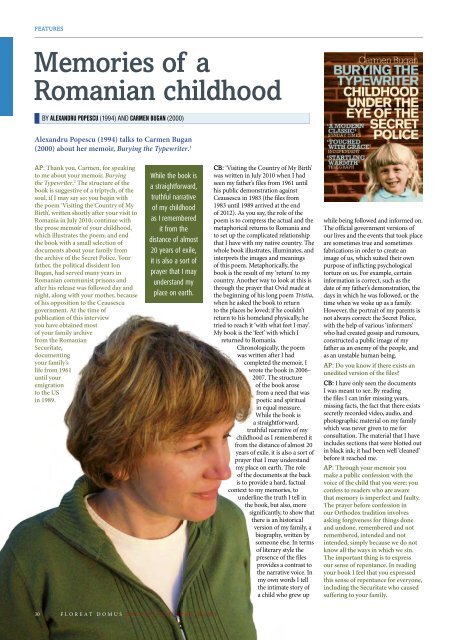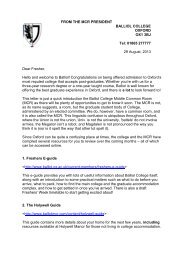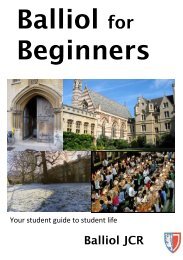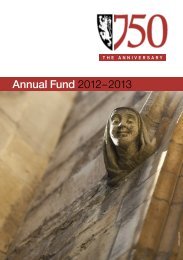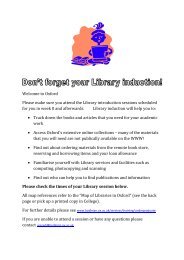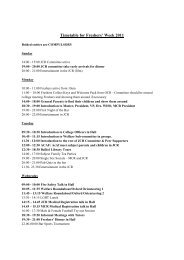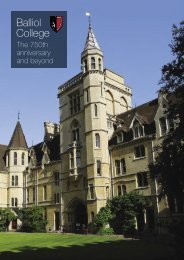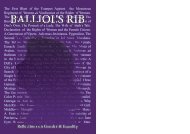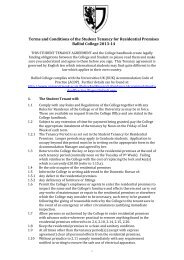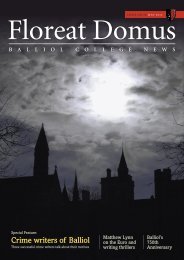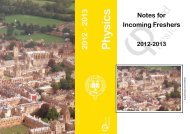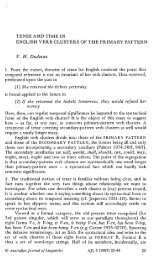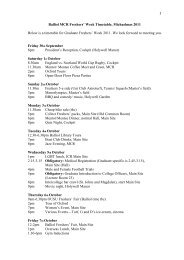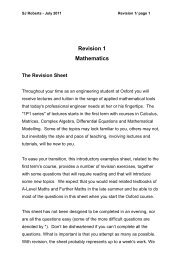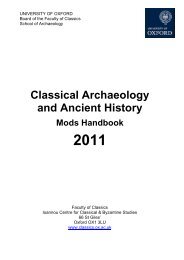Issue 19, 2013 - Balliol College - University of Oxford
Issue 19, 2013 - Balliol College - University of Oxford
Issue 19, 2013 - Balliol College - University of Oxford
You also want an ePaper? Increase the reach of your titles
YUMPU automatically turns print PDFs into web optimized ePapers that Google loves.
features<br />
Memories <strong>of</strong> a<br />
Romanian childhood<br />
By AleXAnDru PoPescu (<strong>19</strong>94) AND cArmen BugAn (2000)<br />
Alexandru Popescu (<strong>19</strong>94) talks to Carmen Bugan<br />
(2000) about her memoir, Burying the Typewriter. 1<br />
AP: Thank you, Carmen, for speaking<br />
to me about your memoir, Burying<br />
the Typewriter. 2 The structure <strong>of</strong> the<br />
book is suggestive <strong>of</strong> a triptych, <strong>of</strong> the<br />
soul, if I may say so: you begin with<br />
the poem ‘Visiting the Country <strong>of</strong> My<br />
Birth’, written shortly after your visit to<br />
Romania in July 2010; continue with<br />
the prose memoir <strong>of</strong> your childhood,<br />
which illustrates the poem; and end<br />
the book with a small selection <strong>of</strong><br />
documents about your family from<br />
the archive <strong>of</strong> the Secret Police. Your<br />
father, the political dissident Ion<br />
Bugan, had served many years in<br />
Romanian communist prisons and<br />
after his release was followed day and<br />
night, along with your mother, because<br />
<strong>of</strong> his opposition to the Ceausescu<br />
government. At the time <strong>of</strong><br />
publication <strong>of</strong> this interview<br />
you have obtained most<br />
<strong>of</strong> your family archive<br />
from the Romanian<br />
Securitate,<br />
documenting<br />
your family’s<br />
life from <strong>19</strong>61<br />
until your<br />
emigration<br />
to the US<br />
in <strong>19</strong>89.<br />
While the book is<br />
a straightforward,<br />
truthful narrative<br />
<strong>of</strong> my childhood<br />
as I remembered<br />
it from the<br />
distance <strong>of</strong> almost<br />
20 years <strong>of</strong> exile,<br />
it is also a sort <strong>of</strong><br />
prayer that I may<br />
understand my<br />
place on earth.<br />
CB: ‘Visiting the Country <strong>of</strong> My Birth’<br />
was written in July 2010 when i had<br />
seen my father’s files from <strong>19</strong>61 until<br />
his public demonstration against<br />
Ceausescu in <strong>19</strong>83 (the files from<br />
<strong>19</strong>83 until <strong>19</strong>89 arrived at the end<br />
<strong>of</strong> 2012). As you say, the role <strong>of</strong> the<br />
poem is to compress the actual and the<br />
metaphorical returns to Romania and<br />
to set up the complicated relationship<br />
that i have with my native country. the<br />
whole book illustrates, illuminates, and<br />
interprets the images and meanings<br />
<strong>of</strong> this poem. Metaphorically, the<br />
book is the result <strong>of</strong> my ‘return’ to my<br />
country. Another way to look at this is<br />
through the prayer that ovid made at<br />
the beginning <strong>of</strong> his long poem Tristia,<br />
when he asked the book to return<br />
to the places he loved; if he couldn’t<br />
return to his homeland physically, he<br />
tried to reach it ‘with what feet i may’.<br />
My book is the ‘feet’ with which i<br />
returned to Romania.<br />
Chronologically, the poem<br />
was written after i had<br />
completed the memoir. i<br />
wrote the book in 2006–<br />
2007. the structure<br />
<strong>of</strong> the book arose<br />
from a need that was<br />
poetic and spiritual<br />
in equal measure.<br />
While the book is<br />
a straightforward,<br />
truthful narrative <strong>of</strong> my<br />
childhood as i remembered it<br />
from the distance <strong>of</strong> almost 20<br />
years <strong>of</strong> exile, it is also a sort <strong>of</strong><br />
prayer that i may understand<br />
my place on earth. the role<br />
<strong>of</strong> the documents at the back<br />
is to provide a hard, factual<br />
context to my memories, to<br />
underline the truth i tell in<br />
the book, but also, more<br />
significantly, to show that<br />
there is an historical<br />
version <strong>of</strong> my family, a<br />
biography, written by<br />
someone else. in terms<br />
<strong>of</strong> literary style the<br />
presence <strong>of</strong> the files<br />
provides a contrast to<br />
the narrative voice. in<br />
my own words i tell<br />
the intimate story <strong>of</strong><br />
a child who grew up<br />
while being followed and informed on.<br />
the <strong>of</strong>ficial government versions <strong>of</strong><br />
our lives and the events that took place<br />
are sometimes true and sometimes<br />
fabrications in order to create an<br />
image <strong>of</strong> us, which suited their own<br />
purpose <strong>of</strong> inflicting psychological<br />
torture on us. For example, certain<br />
information is correct, such as the<br />
date <strong>of</strong> my father’s demonstration, the<br />
days in which he was followed, or the<br />
time when we woke up as a family.<br />
However, the portrait <strong>of</strong> my parents is<br />
not always correct: the secret Police,<br />
with the help <strong>of</strong> various ‘informers’<br />
who had created gossip and rumours,<br />
constructed a public image <strong>of</strong> my<br />
father as an enemy <strong>of</strong> the people, and<br />
as an unstable human being.<br />
AP: Do you know if there exists an<br />
unedited version <strong>of</strong> the files<br />
CB: i have only seen the documents<br />
i was meant to see. By reading<br />
the files i can infer missing years,<br />
missing facts, the fact that there exists<br />
secretly recorded video, audio, and<br />
photographic material on my family<br />
which was never given to me for<br />
consultation. the material that i have<br />
includes sections that were blotted out<br />
in black ink; it had been well ‘cleaned’<br />
before it reached me.<br />
AP: Through your memoir you<br />
make a public confession with the<br />
voice <strong>of</strong> the child that you were; you<br />
confess to readers who are aware<br />
that memory is imperfect and faulty.<br />
The prayer before confession in<br />
our Orthodox tradition involves<br />
asking forgiveness for things done<br />
and undone, remembered and not<br />
remembered, intended and not<br />
intended, simply because we do not<br />
know all the ways in which we sin.<br />
The important thing is to express<br />
our sense <strong>of</strong> repentance. In reading<br />
your book I feel that you expressed<br />
this sense <strong>of</strong> repentance for everyone,<br />
including the Securitate who caused<br />
suffering to your family.<br />
30<br />
FLoReAt DoMus BALLioL CoLLeGe neWs


